Table of contents:
1. Introduction;
2. WooCommerce platform;
3. Shopify platform;
4. WIX Platform;
5. Tray Platform;
6. Cloudshop Platform;
7. Interago Platform;
1. Introduction
Well, it's 2024, and our article about the 2023 Online Store platform review helped a lot of people, now it's time to update you on what's new in 2024. It took us a while, however, better late than never!
Okay, taking into account the number of people we helped with the platform review in the 2023 article, I will write this content along the same lines, as many people contact us with questions about platforms for creating an Online Store, and mainly asking questions. if our team has the expertise to maintain websites that are already live.
As we noticed a lot of demand on this subject, I will write you a new review, to address virtual store platforms, trying to follow a slightly more technical but didactic bias, and I hope to be able to solve your main doubts!
The goal is for you to leave with enough background to be able to choose the ideal platform for your needs.
Remembering that we are a company with more than 14 years of experience in the Webdesign market and high performance in search engine results (SEO), so we believe we have enough experience to talk about Woocommerce, Shopify, Wix, Tray, Nuvemshop and others. others.
These will be the platforms we chose to do a detailed review, especially because they are the most popular on the market. in 2024According to Built with trends.
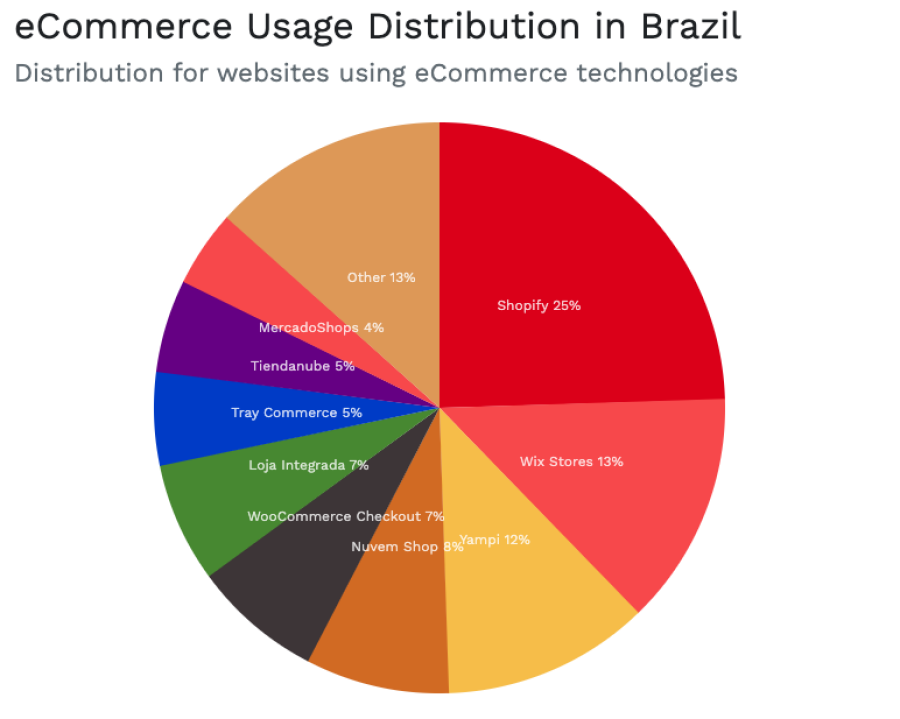
From 2023 until today, April 24, 2024, there has not been a very sudden movement in the platform market. As we can analyze in Buildwith Trends, the number of virtual stores continues to be mostly on the platforms we created in 2023, so we can continue to benefit from all the research we have already carried out. The biggest difference you will see in this article will be Interago. Our platform now has its own website, so if you want to know a little more about Interago's resources, visit the new website address and compare the resources: https://www.interago.com.br/site/recursos
We also have some cases gaining notoriety in online sales within our platform. If you are curious, follow the links below:
Well, now let's continue with our evaluation of each of the 6 largest Virtual Store platforms in Brazil in 2024. If you have any questions, contact us! We are available to help.
2. WooCommerce Platform
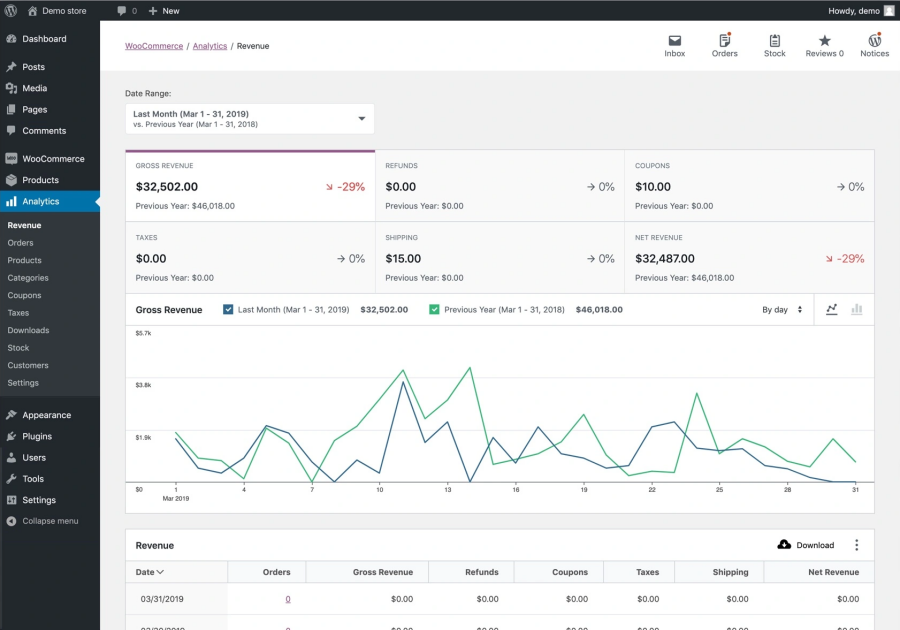
Let's start talking about WordPress, which is a platform that is constantly being mentioned in our routine.
WordPress is a robust and free content management system and will be our first choice on the list of platforms for creating online stores in 2024.
In the beginning, it was mostly used to create institutional websites and blogs, however, as the system has existed for over 19 years, it has already been adapted for various purposes, including the creation of virtual stores.
It was built with HTML, CSS, JavaScript and PHP and the essence of WordPress is collaboration, as the platform is supported by a large community of developers to keep it up to date.
Many difficulties to work on the platform have also been explored by the community, so if you come across an error / difficulty in WooCommerce, you will probably find a solution on Stack Overflow.
It is important to have this introduction about WordPress, to understand that the platform is robust and may not serve needs that demand agility and simplicity.
For example, WordPress is a very large system and has so many possibilities, that it ends up becoming complex to create a simple virtual store.
Imagine that a simple Virtual Store needs a product catalogue, a payment system and a way to store orders so that they can be managed by the shopkeeper. Sounds simple, correct? Well, when it comes to WordPress, no.
First, you'll need to find a server that supports the entire platform structure. Afterwards, you will need to find a template or create a custom design for your website and to finish (explaining it in a very simplified way), you will have to adapt your entire system to Brazilian standards, looking for translation plugins, payment, shipping and others.
Another important point is that WordPress has thousands of plugins available to enhance your Virtual Store, however, you need to buy plugins from reliable suppliers, so that your project does not run security, performance and maintenance inconsistencies.
The fact that WordPress is an open source platform gives the opportunity for everyone to develop plugins, and this can open loopholes for inexperienced developers to install malicious or poorly made plugins, and this compromises the entire project created in WordPress.
Five advantages and disadvantages of using WooCommerce:
Advantages:
- Easy to use interface:
A user with basic knowledge about technology can easily understand the WooCommerce interface and manage their online store through the platform's dashboard. - Customizable platform:
You can leave your Virtual Store in the standards of the Brazilian user, using plugins for calculating freight, payments and pre-made themes to compose your design. - WooCommerce is open source and free:
Are you an experienced WordPress developer? Use the free platform to set up your Virtual Store and save. Otherwise, you will have costs to set up a Virtual Store, and without experience, cheap can be expensive, so be aware. - WooCommerce is a platform developed with good practices in security standards:
With the right advice, you can create your Online Store and keep it safe. Keep platform updates up to date and use reliable plugins, so you will have a safe and secure environment. - It is an optimized platform for search engines (SEO):
Having your site optimized for the demands of search engines is very important, especially when we are dealing with Virtual Stores. Your products need to be indexed with the proper Rich Snippets to gain notoriety and be found organically, and WooCommerce has plugins that can improve these search results.
Disadvantages:
- On a large scale, the platform needs to be handled wisely:
You will need to rely on experienced technicians if your flow of purchases and accesses is very large. It is important that your team of developers has knowledge about infrastructure and handling big data, so that the solution continues to meet your needs without drops or speed misfortunes. These questions always influence the conversions of a Virtual Store. - Costs with experienced developers:
Look, setting up your Virtual Store with WooCommerce will, without a doubt, demand qualified professionals to create and maintain your platform, if you are not a developer. So be prepared for labor and infrastructure costs. - Plugin costs:
As we mentioned above, professional and reliable plugins cost money, so you will have costs to buy good modules to make your Virtual Store in the standards that the Brazilian user is used to. - The widespread platform also has its downsides:
As WooCommerce is an open source platform, many people have access to the code, and this opens it up for malicious users to study loopholes to carry out fraud and scams. Because of this, be aware that this reality exists, and official support does not exist or is limited, in the platform community. - The platform is optimized to be used outside Brazil and mainly in English:
WooCommerce is a solution from outside Brazil, so if you want something for the national market, thinking about the alternative of using WooCommerce instead of platforms made for the Brazilian standard must be done with a lot of planning and wisdom so as not to lose investments in a way displicent.
3. Shopify Platform:
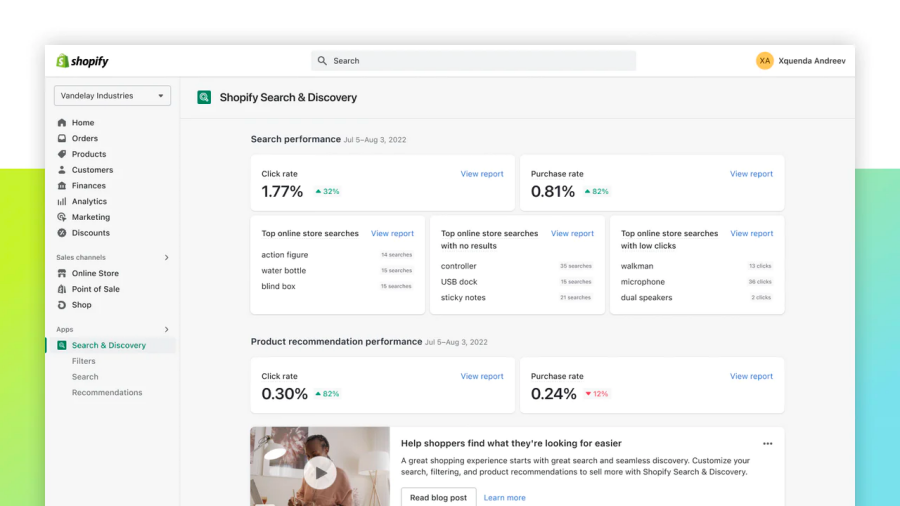
According to Buildwith Trends, in Brazil, Shopify is the platform responsible for 25% of Virtual Stores.
This percentage is quite considerable, and we couldn't leave it out of our list.
Shopify is a Canadian platform for Online Store Creation and is our second choice in the list of online store platforms for 2024.
It was launched in 2004 (it's been on the road for a while) and is a platform owned by a private company, and this fact raises several questions that we need to be aware of.
First, we need to pay attention to the company's policies, since when creating your account to set up a Virtual Store, you will be hosting your information in a database that you will not have control over and will also be using resources from a closed infrastructure.
Therefore, if Shopify ever decides to sell itself, all of its customer base and information will be in the possession of other holders.
I'm not saying that this is bad, but you need to be aware that you are buying an entire plastered structure, however, made possible by professionals for the creation of Virtual Stores.
Well, right, you're not going to edit the server, you're not going to access databases or the source code of the project, and is that good?
Yes! It's really good, and the reason is that you don't have to worry about infrastructure, security, support and just focus on advertising and strategies to sell more through the Internet.
Shopify has a Brazilian version adapted to our Brazilian sales dynamics, so when creating your account, you can buy a pre-made design, configure payment methods and shipping in the Brazilian user pattern.
Shopify's rigid structure provides you with edits to the product catalog, some parts of its design, orders, payments, shipping, discounts, promotions, and sales reports.
The fact that the structure is plastered also prevents configurations that may harm your Virtual Store from being carried out.
Okay, let's go through our list of advantages and disadvantages of using Shopify as an Online Store platform.
Advantages:
- The platform is a CMS (content management system) with an intuitive interface:
By hiring Shopify, you'll have access to a manageable environment to control orders, payments, stock and pull sales reports, so it's easy to use. - You will have access to a plugin shop, to buy themes, templates, API's and more:
They offer a range of templates and themes so you can create the design you want for your Online Store, so if you don't need to make major adaptations, buy a theme, customize colors and some blocks to launch your Online Store. - Integration with international payment platforms:
With Shopify, you can configure the payment methods you want. Paypal, Amazon Pay, Stripe and other methods optimized for the national market, such as Mercado Pago. - As we mentioned before, Shopify is already robust enough to offer modules from third-party partners to install on your Online Store:
Shopify's plugin store is controlled, which is very good to prevent inexperienced developers or inconsistent plugins from being made available to merchants. This brings much more security and comfort when choosing a new tool to implement in your Virtual Store. - Optimized for search engines:
Well, Shopify is a platform for creating a Virtual Store, so it is clear that the entire environment will be optimized for SEO, with rich snippets and ranking with structured data for your products.
Disadvantages:
- Monthly payment:
You will be contracting a private platform to create your Online Store, so there are monthly charges that can increase according to the size of your scale. - Fees upon transactions:
In addition to the monthly payments, Shopify will charge you for each transaction your Online Store has, so be aware of these costs when pricing your products to have a viable profit margin for your business. - Limitation on the customization of your Virtual Store:
You will have access to some pre-made designs, and you will be able to edit some blocks, however, for a business that requires greater customizations, such as creating landing pages to present a certain product, or robust presentations for a product that has many characteristics, there are no viable open source options, so the immobilization can limit your ideas. - Limitations in creating features:
There are shopkeepers who need to have their Virtual Store connected with customized ERPS and APIs, and with Shopify you will find it difficult to practice such integrations, since the platform has technical limitations. If you need something that is out of the plugin store, chances are this solution won't work for you. - And lastly, Shopify has control over your data:
As we mentioned earlier, its entire structure will depend on the Shopify environment, so if the company ceases to exist one day, or something happens, such as crashes, hackers, etc., your data will be in danger, so be aware of this question when hiring a private platform to create your Virtual Store.
4. WIX Platform:
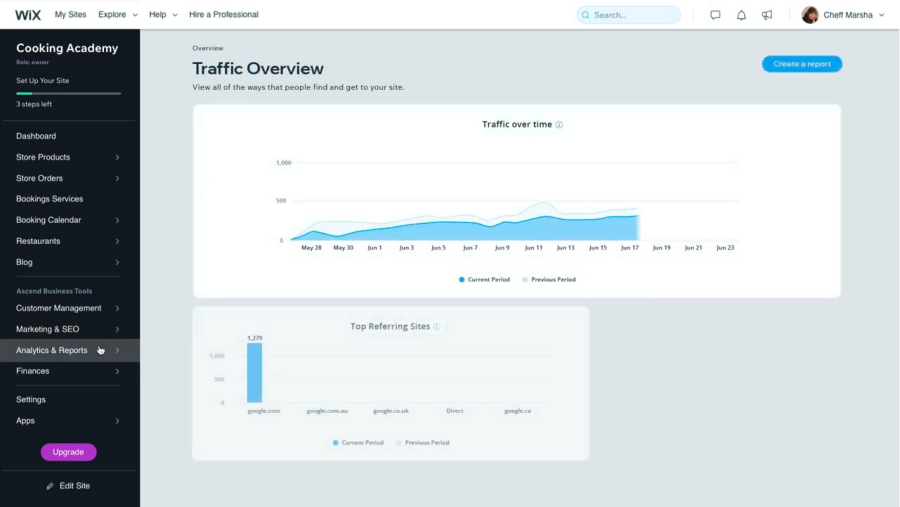
WIX is a CMS whose main objective is to provide a friendly interface for its users to be able to assemble website designs by dragging and dropping elements.
We ranked WIX as the third best platform to create an online store in 2024.
The company is private and was founded in 2006, it is Israeli and had its public capital in 2007 and it was in 2011 that versions of WIX in other languages were launched, which ended up giving a boom in popularity.
I'm sure you've gotten some hype from them showing how easy it would be to create a website within the platform.
Sure, WIX serves several purposes, creating institutional websites, publishers and also e-commerce, but is it optimized for this?
The answer unfortunately is no. It's a great solution for anyone wanting to get started on the internet, but as soon as you get a little more robust, and feel the need to enter marketplaces, for example, you're going to have problems with WIX.
There is also a limitation in terms of interface and customization. Despite the drag'n drop that is promised to lay people in relation to web programming, creating custom functionality for more complex businesses will not be possible.
And there are also all the points we raised at Shopify, about the fact that you are hiring a private company, where their focus is on creating institutional websites, not robust Virtual Stores, so I would say that setting up a WIX to be a Store Virtual is a temporary solution.
Sometimes it's even better to start selling on marketplaces and social networks, such as Mercado Livre, Amazon, Magalu, Instagram, Facebook, among others.
Well, we don't want to completely discard WIX, it exists, it's a well-made tool and for those who want to study and correctly plan the creation of a Virtual Store, they can venture into the platform to start selling online.
Now let's go to the advantages and disadvantages of using WIX to create a Virtual Store
Advantages:
- The Drag'n Drop interface will help you with your design:
WIX is famous for its drag-and-drop editing and layout functionality, so you'll be able to make some changes without having to hire an experienced designer to do it. - You might be surprised by the values practiced by WIX:
WIX offers free plans, but to sell online you will need to pay a monthly fee, however, this monthly fee is not as high as other Virtual Store creation platforms. - You can set up your Online Store without knowing how to code:
Create your account, choose a template, configure your payments and shipping, register your products and you will have a safe environment to sell online. (Of course, nothing is that easy, so although you can do everything without coding, you will need to study to learn how to compose a design and other basic knowledge of SEO and promotion). - Integrations with payment methods:
WIX has integrations with Mercado Pago and PagSeguro, for example. Deliveries and freight are calculated by mail, so you will be supported by interesting features adapted for the Brazilian market. - There is a plugin shop:
Yeah... you'll have access to a plugin store, with the possibility of installing functionalities tested and approved by WIX, being safe, however, not always free, so always be attentive to verify the need and the cost benefit of installing new ones functions in your Online Store.
Disadvantages:
- If you're looking for scale, WIX will end up limiting your idea:
Imagine that you already have some notoriety in online sales using Mercado Livre and other marketplaces and now you want to migrate to your own E-commerce, to sell free of charge. WIX may not offer what you want, which would be a robust and open source environment for you to put your business individualities into practice. - Well, Drag'n Drop (drag and drop) can be a virtue and a defect:
You will be limited to just doing the layout that the platform proposes and you will not have access to the source code of the page, to create what you want. - Limited customizations regarding functionality:
Imagine that you received a great proposal for fees from a finance company to carry out your Online Store transactions for her. Well, if this finance company does not have integration with WIX, you will not be able to use it, as well as other packages with machines and among others. The same we can quote for freight. If you have custom carriers, WIX will limit you to couriers. - There are payment fees per transaction:
Well, you won't be able to run from the fees per sale. WIX has its own fees on top of the sale made, and you need to be aware of the amounts they will be charging on your sales. - WIX does not have an SEO optimization for Online Stores:
The structured data that we already mentioned in this article is not optimized for Virtual Stores on WIX, which can limit your visibility in search engines.
5. Tray Platform
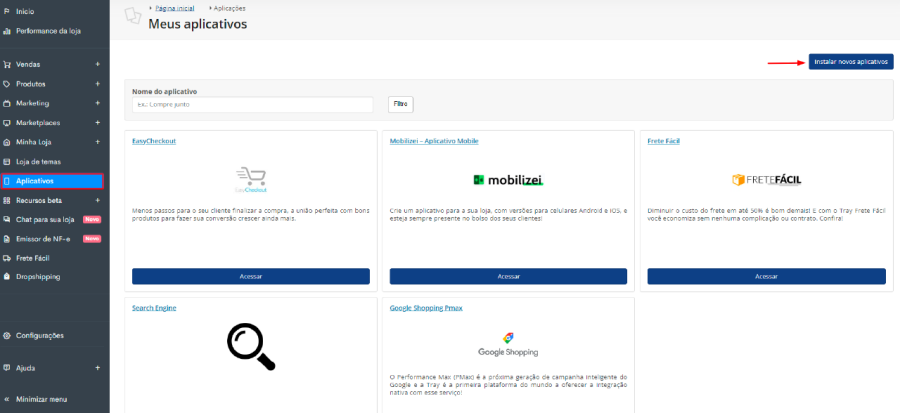
Tray E-commerce is a technology platform created by Brazilians, acquired by Locaweb and is also a private solution for creating Virtual Stores.
Tray will be our fourth option as a platform for creating an online store in 2024.
In Buildwith Trends data, we found that 5% of the Virtual Stores created in Brazil are on the Tray platform, including Eco Webdesign, which has already created some Virtual Stores within the platform.
As we talked about Shopify and WIX, Tray E-commerce follows some standards in its charges and also in its management interface.
At Tray, you'll have access to a plugin shop, to buy templates with pre-designed designs, you'll be able to integrate API's and functionalities developed by third-party companies.
Those developers who create outsourced features for Tray are audited, so you'll be using tools that are approved by Tray's professionals.
Your entire Virtual Store will be in a rigid environment, without access to the source code, however, in Tray's interface, you will be able to make edits in CSS (cascate stylesheet), and this is very interesting for store owners who want to customize the design of their site, however, we must not forget that the environment is plastered, and depending on the theme you choose, it will not be possible to edit some layouts.
Another important point is that Tray offers automatic integration with several marketplaces, making it possible to send your products, registered on the platform, to Mercado Livre, Shopee, Amazon, among other major channels.
We can't say that everything will work, our experiences with most integration hubs have been frustrated, as nothing works correctly, requiring a lot of technical support.
Sending products to Marketplaces also deserves an article just to deal with the subject, because we have a lot of experience with sending products, and everything needs to follow different rules and individualities for each of the marketplaces in the market (sending products to Mercado Livre through your Virtual Store, for example, is very difficult and if you do not know all the policies that ML requires, your products will not be available within the marketplace catalog).
Well, okay, now that we understand a little about Tray, let's get to the most important thing, which are the advantages and disadvantages of creating a Virtual Store within Tray E-commerce.
Advantages:
- You will be in a safe and up-to-date environment:
Tray E-commerce is a platform for creating virtual stores with closed source code. Your data will be in the company's database, and you will use checkout features in a secure environment provided by Tray. - Trusted plugin store:
You will be able to access verified and audited third-party plugin store to install on your Online Store. ERP's for order controls, templates and payment methods. - Tray is adapted for the Brazilian market:
You will be able to integrate with custom carriers, you will have an optimized environment for Brazilian users and you will have a technical support environment with professionals. - Tray has a partner agency program:
A very interesting point is Tray's partnership program, where they certify other companies to work within their platform. You can find these companies and hire third-party services to help you manage your platform - Good solution for small shopkeepers:
The platform is intuitive, you can do the math and perform some settings yourself, so if you have experience with website management platforms, you will be able to set up a small environment to start.
Disadvantages:
- You will be dependent on Tray:
Your environment will be all on Tray's infrastructure, and you won't have access to the source code. Therefore, if you want to expand your business, and your needs are not within the scope offered by Tray, the solution will probably not suit you. - Monthly fee and transaction fees:
As your Virtual Store grows, you will pay higher fees to register more products and have more hits. In the last plan of the platform, you will have fees on top of each transaction carried out, so be aware of the costs that the platform can generate for your business. - Plastered platform for design:
Tray has templates, and you'll be able to install some pre-molded design, but if you want to create new blocks, new layouts or other features beyond what they release for you, the platform probably won't meet your needs. - Support can be lacking:
Tray has a lot of demand, and small shopkeepers are usually served through email calls. Depending on your question, it could be weeks before your question is answered. If it's serious, you might end up frustrated. - Although intuitive, for some operations you will need an experienced technician:
Tray offers integrations with several Marketplaces, and each marketplace has its own product registration policies, so not every shopkeeper can adapt their environment to sell on Amazon or Mercado Livre. And this is just one of thousands of features that can end up returning inconsistency.
6. Cloudshop Platform
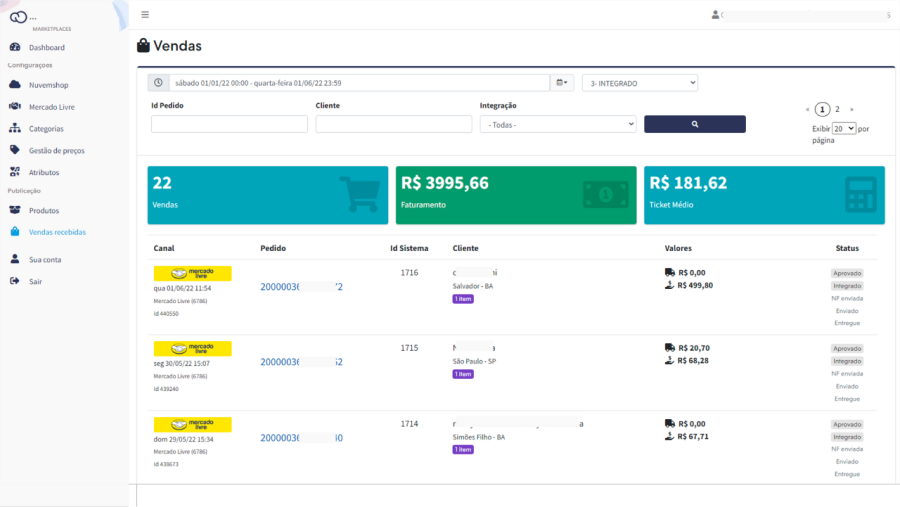
8% of the Brazilian population that works with Virtual Stores, in 2024, uses Nuvemshop. This number determines that this platform can be an option to create your Virtual Store.
Nuvemshop is our fifth platform option to create a Virtual Store in 2024.
Well, Nuvemshop is a Brazilian platform, private and very popular in Latin America and promises to offer an optimized environment for users in Latin America itself. This proposal is very interesting, since each country has its particularities for making online sales, so creating an optimized Virtual Store for your area of expertise solves half of all your problems.
The platform has existed since 2011, and is headquartered in Argentina and Brazil.
A characteristic that we must point out in Nuvemshop is the promise of being able to integrate its products with the largest Marketplaces in the market and also social networks, such as facebook and instagram.
However, always be aware that these integrations are complicated, so you, as a retailer, need to carefully study each marketplaces policy and rate, in order to sell without incurring losses!
Another very cool feature of Nuvemshop is the fact that it provides an option for you to set up your Virtual Store for free. So they make their entire environment available, so you can start small, with a few products, and then evolve as your sales grow.
For small shopkeepers, or people who want to start selling products online, Nuvemshop can be a good option.
They also have a store for plugins, integrations, templates and more. We have already scored these items on Shopify, Tray and WIX, so you probably already understood that these platforms have similar functionality, despite having completely different panels.
So let's go to our points of advantages and disadvantages, which is what interests us most!
Advantages:
- Nuvemshop is made for the Latin American public:
Like Tray, Nuvemshop was made to serve Brazilians, with shipping, payment and usability solutions integrated with tools focused on the Latin American public. - Promise of ease to create a Virtual Store through an intuitive Interface:
Nuvemshop has free plans and promises to provide an easy environment for the shopkeeper to be able to open an account, configure his Virtual Store and start sales. And another cool feature is that in the Impulso plan, you have access to edit HTML, CSS and JavaScript, which helps in creating differentiated designs. - Your Virtual Store in a protected environment:
You'll talk to technicians who offer focused support for the Latin American public and you won't have to worry about security, as your Virtual Store will be within Nuvemshop's infrastructure, updated by its engineers. - Sell on multiple marketplaces:
You can register your products and integrate them in different marketplaces and social networks to reach the audience of these other platforms. - Plugin Store:
Like WIX, Shopify and Tray, Nuvemshop has its store with third-party plugins, tested and developed by certified partners, so if you want to customize your environment with pre-made APIs and ERPS, Nuvemshop may meet your needs
Disadvantages:
- Limitation to have scale:
Nuvemshop does not provide access to the source code of your project, so think about cases where you need customized solutions for your own business. - Limitation on the customization of your Virtual Store:
As you only have access to edit a few blocks of your website, and the entire environment is embedded in a blocked infrastructure, your customizations will be limited to what the platform releases. - Monthly fee and fees upon transactions:
As your Virtual Store gains scale, you will need to increase your plan to have different payment methods, customer service and reports. - Limitations on SEO issues:
Nuvemshop's platform provides the basic structured data in relation to SEO, but if you need an environment optimized for search engines and open to making your own settings, Nuvemshop may end up limiting you. - Limitation on integrations and plugins:
Well, you'll be in the Nuvemshop environment and limited to everything they release. This can often be an advantage as well as a disadvantage, so it all depends on your feasibility studies to grow your business.
7. Interago - Eco Webdesign Platform to Create Virtual Store
Right, we went through this entire list, and the question remains: which platform does Eco Webdesign use to create Virtual Stores?
So now is the right time to mention our sixth platform option to create a virtual store in 2024.
As we mentioned at the beginning of this article, we have 14 years of experience and we have worked with all the platforms mentioned in this review. Well, because of this we acquired enough authority to develop our own platform, with the freedom to add all the features that we missed in other tools.
The name of the platform is Interago and it already has more than 350 websites built and 3 million pages created. In this environment we are able to create small, medium and large virtual stores.
We worked hard, for 2 and a half years, to build an Online Store platform that met all our needs and also the needs of our customers, with a safe environment, with a competitive monthly fee and most importantly, providing a humanized form of relationship for those who want to sell online.
If you're reading this article, and you've come this far, you have a very simple pain point: selling your products over the internet, without having to worry about technical problems, and our solution was thought out exactly for you.
Our commercial team will understand your needs, will spend all the experience acquired over 14 years dealing with sales on the internet and will provide you with all the information necessary to be able to sell, without selling dreams or illusions, let's be serious, because the What else exists on the internet are vague promises and quackery.
Well, if you want to walk this path with us, get in touch and talk to our team. I will also leave useful links so that you can better understand Interago, its differences with other platforms and also the values we practice.
Send us a message, we can help you succeed with the internet!
And if you have any questions about this article, please contact me directly by sending a message to support@ecowebdesign.com.br
We will be happy to help!
You might also like to read
6 E-Commerce Platforms to Create Your Virtual Store 2024
In this article, we'll cover the 6 best platforms to create your Online Store in 2024. We'll compare technologies, features, usability and more.
On 24/04/2024 at 16:14 pm - Updated on 28/04/2024 at 13:55 pm
6 E-Commerce Platforms to Create Your Virtual Store 2023
In this article, we'll cover the 6 best platforms to create your Online Store in 2023. We'll compare technologies, features, usability and more.
On 02/06/2023 at 16:40 pm - Updated on 24/04/2024 at 15:59 pm
How to create a sales website in 2024 in 7 steps
In this article you can find out about the entire process for creating a sales website in 7 steps. Products, suppliers, accounting, platform.
On 23/04/2024 at 16:26 pm - Updated on 24/04/2024 at 10:21 pm
What is the cost to set up an Online Store in 2024?
From platform to packaging. Understand the essential costs of having a store and selling online
On 01/04/2024 at 21:25 pm - Updated on 01/04/2024 at 21:41 pm
How Much Does It Cost to Create an Online Store and Sell on the Internet?
Do you need a quote to create an Online Store? In this article we will help you if you have questions about the costs of creating your online sales website.
On 09/10/2023 at 11:11 pm - Updated on 29/11/2023 at 10:35 pm
We create a Virtual Store Ready for Your Sales
We created a Ready Virtual Store. Professional design focused on your audience, structure with SEO and specialized service to help you sell.
On 14/06/2023 at 15:46 pm - Updated on 16/10/2023 at 08:53 pm
Which is the best platform to sell your products on the internet in 2023
Access to the best product sales platform on the internet, a reliable solution for your company.
On 10/05/2023 at 14:49 pm - Updated on 16/10/2023 at 08:53 pm
Interago - Platform to Create Professional Online Store
Eco Webdesign, with more than 13 years of expertise, has developed Interago, an optimized platform to Create a Virtual Store with great cost benefit.
On 02/06/2023 at 16:40 pm - Updated on 16/10/2023 at 08:53 pm










